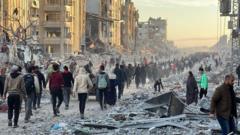As Palestinians in Gaza initially celebrate the ceasefire, the joyous moments quickly dim as they face the destruction of their homes. In Jabalia, overwhelming loss and sorrow dominate the return, highlighted by personal tragedies and a community torn apart by violence. The fragile ceasefire agreement underscores the deep-seated pain as families reflect on their losses amidst ongoing fears for the future.
Gazans Return to Ruins as Ceasefire Holds Fragile Hope

Gazans Return to Ruins as Ceasefire Holds Fragile Hope
Amidst the celebrations for a ceasefire, many Gazans confront the stark reality of devastation as they return to their destroyed homes.
Empty line
As Palestinians poured into the streets to celebrate the ceasefire, their moments of joy were overshadowed by the grim reality awaiting them at home. In Jabalia, the northern town housing the largest refugee camp in the Gaza Strip, residents returned to find entire neighborhoods reduced to rubble.
Among them was Duaa al-Khalidi, who expressed her grief to BBC News, sharing her harrowing experience of losing her husband, mother-in-law, and sister-in-law, whose bodies remain entombed beneath the debris. The 28-year-old mother of two stated, "I want nothing but their bodies so I can bury them with dignity."
Jabalia camp, once sheltering over 250,000 Palestinians, became ground zero during the war, with reports estimating around 4,000 casualties, according to the health ministry run by Hamas. Amid the devastation, Hussein Awda, a professional weightlifter, documented his return from Gaza City, mourning the loss of ten family members at the war's outset. He poignantly remarked, "The war killed everything beautiful inside us."
In the southern city of Khan Younis, armed Hamas fighters paraded through the streets, greeted by celebratory crowds. However, many residents, like Ahmed Abu Ayham, found little to celebrate, expressing deep sorrow for the overwhelming losses they endured. "We are in pain, deep pain," he stated.
As people moved toward Rafah, on the Egyptian border, hopes for a brighter future mixed with the harsh reality of what they had lost. Journalist Muhammad al-Jamal reflected on his own destruction, stating, "The house was razed to the ground; everything was reduced to rubble."
The initial hours of the ceasefire revealed its fragility, with a three-hour delay leading to more violence, including reported fatalities attributed to Israeli strikes. Although three female hostages were returned to Israel, the atmosphere in Gaza remained charged with fear and uncertainty about the future. Thus, while there are glimmers of hope, the true depth of suffering experienced by the residents remains a haunting aspect of their reality.
As Palestinians poured into the streets to celebrate the ceasefire, their moments of joy were overshadowed by the grim reality awaiting them at home. In Jabalia, the northern town housing the largest refugee camp in the Gaza Strip, residents returned to find entire neighborhoods reduced to rubble.
Among them was Duaa al-Khalidi, who expressed her grief to BBC News, sharing her harrowing experience of losing her husband, mother-in-law, and sister-in-law, whose bodies remain entombed beneath the debris. The 28-year-old mother of two stated, "I want nothing but their bodies so I can bury them with dignity."
Jabalia camp, once sheltering over 250,000 Palestinians, became ground zero during the war, with reports estimating around 4,000 casualties, according to the health ministry run by Hamas. Amid the devastation, Hussein Awda, a professional weightlifter, documented his return from Gaza City, mourning the loss of ten family members at the war's outset. He poignantly remarked, "The war killed everything beautiful inside us."
In the southern city of Khan Younis, armed Hamas fighters paraded through the streets, greeted by celebratory crowds. However, many residents, like Ahmed Abu Ayham, found little to celebrate, expressing deep sorrow for the overwhelming losses they endured. "We are in pain, deep pain," he stated.
As people moved toward Rafah, on the Egyptian border, hopes for a brighter future mixed with the harsh reality of what they had lost. Journalist Muhammad al-Jamal reflected on his own destruction, stating, "The house was razed to the ground; everything was reduced to rubble."
The initial hours of the ceasefire revealed its fragility, with a three-hour delay leading to more violence, including reported fatalities attributed to Israeli strikes. Although three female hostages were returned to Israel, the atmosphere in Gaza remained charged with fear and uncertainty about the future. Thus, while there are glimmers of hope, the true depth of suffering experienced by the residents remains a haunting aspect of their reality.























